Oct 2021 2nd edition
Oct 2021 2nd edition Joy
English PDF version
Translations
Afrikaans
isiNdebele
isiXhosa
isiZulu
Sepedi
Sesotho
Setswana
Siswati
Tshivenda
Xitsonga
A greenlight for SA healthcare
A greenlight for SA healthcare JoyPresident Cyril Ramaphosa has hailed a new COVID-19 and cancer vaccine initiative launched by world-renowned Dr Patrick Soon-Shiong as a game changer for South Africa's healthcare and the pharmaceutical industry.
 The initiative was launched by Dr Soon-Shiong’s digital healthcare company NantWorks. Its aim is to build pharmaceutical and vaccine capacity not only in South Africa but for the entire African continent.
The initiative was launched by Dr Soon-Shiong’s digital healthcare company NantWorks. Its aim is to build pharmaceutical and vaccine capacity not only in South Africa but for the entire African continent.
This will kickstart the transfer technology used in the manufacturing of COVID-19 and cancer vaccines.
“The investment by NantWorks is most timely. For our fight against COVID-19, for infectious disease management, for cancer research and treatment, and for future pandemic preparedness,” President Ramaphosa said.
The initiative is a collaboration between NantWorks’ African division NantAfrica, the Council for Scientific and Industrial Research and the South African Medical Research Council.
The collaboration is the third investment into the country’s pharmaceutical sector following the R10 billion investment into Aspen Pharmacare for the production of Africa’s COVID-19 vaccines and the World Health Organisation’s establishment of the mRNA manufacturing hub in the country.
Dr Soon-Shiong, who was born in South Africa but left the country during Apartheid, said the initiative is the realisation of a lifelong ambition.
“It has been a dream of mine, since I left the country as a young physician, to bring state-of-the-art, 21st century medical care to South Africa. This will enable the country to serve as a scientific hub for the continent,” said Dr Soon-Shiong.
He added that there were unmet needs to treat life-threatening infectious diseases such as AIDS, TB and now COVID-19.
“Of equal concern is the poor survival rate of patients suffering from cancer in South Africa and elsewhere in Africa.
“The astounding advances in science have enabled new paradigms of care involving activating the immune system and changing outcomes for these diseases,” said Dr Soon-Shiong.
– SAnews.gov.za
COVID-19 is real, says ICU doctor
COVID-19 is real, says ICU doctor JoyAn intensive care unit (ICU) doctor is pleading with the public to help healthcare workers remain resilient so that they can continue to fight the Coronavirus Disease (COVID-19) pandemic.
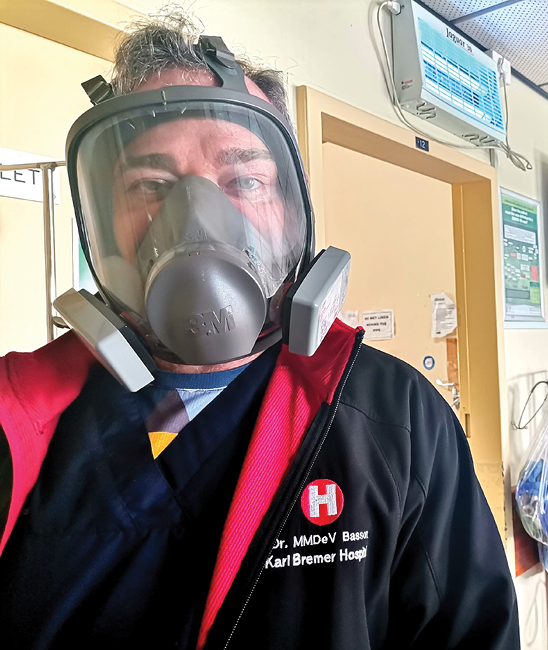 Dr De Vries Basson, the Head of Internal Medicine at the Western Cape’s Karl Bremer Hospital, says his team was under intense pressure during the third wave. As an ICU doctor, he has worked countless hours throughout the pandemic.
Dr De Vries Basson, the Head of Internal Medicine at the Western Cape’s Karl Bremer Hospital, says his team was under intense pressure during the third wave. As an ICU doctor, he has worked countless hours throughout the pandemic.
“The third wave’s intensity was much higher and we saw much younger patients being admitted. They were critically ill.
“What really struck me is that we saw whole families come to hospital for treatment and they were all so ill. You hope you will be able to keep them all safe. COVID-19 is real,” says Dr Basson.
Karl Bremer Hospital had to convert some of its wards into high-care wards to care for the number COVID-19 patients during the third wave. It also saw an increase in non-COVID-19 admissions in early September. “This put added pressure on our teams in ICU and beyond.”
Possible fourth wave
The reality of a possible fourth wave is causing a great deal of anxiety for healthcare workers.
“The pandemic has affected all medical staff, clinical and administrative, in the sense that you work harder and longer hours and you’re under more and more pressure.”
He said healthcare workers are also at risk of contracting COVID-19.
“This pandemic means that we often get home late from work and we’re too tired to go to gym or run. We’re human and we’re tired too. We need your help,” says Dr Basson.
He urges the public to choose vaccination to protect themselves, their loved ones and healthcare workers.
“I am hoping that more people will take the vaccine and that the public will adhere to the general rules of sanitising their hands, wearing their mask, avoiding crowds and staying at home when they are sick.”
For the latest COVID-19 vaccination sites visit: https://sacoronavirus.co.za/active-vaccination-sites/
Do you need funding for your research?
Do you need funding for your research? UrsulaSasol and the National Research Foundation (NRF) have partnered to fund collaborative research grants in science and engineering that will contribute to South Africa’s energy transition and green economy. 
Through the grants, Sasol wants to contribute to the development of research capacity in the country’s institutions of higher learning.
The focus is on scarce skills gaps in the science, technology, engineering and mathematics.
Dr Aldo Stroebel, the Executive Director for Strategic Partnerships at the NRF, says universities are expected to produce meaningful knowledge that solves many of the challenges and questions society has.
“The demand for innovative solutions that respond to socio-economic challenges and opportunities results in an increasing need for collaboration between industry and academia,” he explains.
Former grant beneficiary Professor Zenixole Tshentu was awarded R400 000 from 2019 till 2021. He says the funding has enabled him to work on important projects that have yielded critical knowledge and helped students with their financial needs.
“Postgraduate students are able to receive bursary top-ups and can also be assisted to attend international conferences, by complementing the university funding for conferences. In my case, students also travelled to Sasolburg to work with collaborators,” he says.
Professor Tshentu encourages academics to apply for the funding, as it helps to carry out important research.
“It is also possible to buy small equipment required for the project, via this funding. The flexibility allows one to deal with a budget, based on demands, as the project evolves. The contribution of the Sasol funding to the training of postgraduate students in SA is commendable,” he says.
The funding available for 2022 is for research in the key areas of hydrogen production, renewable energy, energy storage and carbon dioxide conversion to chemicals and fuels.
Who is eligible to apply?
• Academics from any South African university, working in any of the disciplines listed as key areas. Proposals should address the research areas.
• Academics should hold a PhD in a relevant discipline and must have at least five years research experience, after the completion of their PhD.
How to apply
- Application documents can be found at https://www.nrf.ac.za/funding/framework-documents/funding-framework-doc…
- Applications close on Friday, 29 October. Applications can be sent via email to sasolgrants@sasol.com
- For more information, email Dr Pheladi Mohlala at pheladi.mohlala@sasol.com or Dr Zolani Dyosi at Z.Dyosi@risa.nrf.ac.za
Elections: Parties sign code of conduct
Elections: Parties sign code of conduct JoyThe Electoral Commission (IEC) chairperson, Glen Mashinini, says even under the difficult circumstances brought on by the Coronavirus Disease (COVID-19), the IEC is ready to deliver the 2021 Local Government Elections.
 The Local Government Elections will take place on 1 November.
The Local Government Elections will take place on 1 November.
Speaking at the signing ceremony of the Electoral Code of Conduct by political parties contesting the elections, Mashinini said the IEC is surging ahead with preparations.
“As our nation battles with the devastation caused by COVID-19 to our economy and our lives, the Electoral Commission remains hard at work to ensure that these elections are delivered safely in fulfilment of our Constitutional mandate."
He said the introduction of Voter Management Devices (VMD) is nothing short of revolution.
“The VMDs have increased the speed of processing of applications. Approved applications already have their addresses captured. Previously, it would have taken months to capture address details of voters.
“This is a major step in the management of our electoral processes.”
According to the Electoral Commission, 325 political parties will be taking part in the forthcoming local government elections.
Mashinini said the signing ceremony was as important as democracy itself.
“The responsibilities of the political parties, agents and candidates also go beyond abiding by the code. Political parties must also let the public know about the code, promote the purpose of the code and support efforts to educate voters,” he said.
Voters’ roll
The Chief Electoral Officer certified the voters’ roll on 26 September.
The voters’ roll contains the names of 26.2 million voters, 55% of which were women.
Gauteng has the biggest representation on the voters’ roll, with 6.1 million voters, followed by KwaZulu-Natal with 5.4 million.
The biggest age cohort on the voters’ roll is 30 - 39 years, at 6.7 million.
The IEC certified and published lists of candidates contesting these elections recently.
“It is in the hands of all participants in the important elections to ensure that the elections are held in exciting but peaceful conditions. It is the hands of political parties to uphold and defend the Code of Conduct," said Mashinini.” – SAnews.gov.za
Ending corruption in the public service
Ending corruption in the public service JoyThe revelation in Parliament that thousands of public servants have been illegally receiving social grants every month shows we still have a long way to go towards instilling a culture of ethics in the public service.
 Earlier this year, it was also found that around 16,000 employees on the government payroll were irregularly paid the COVID-19 Social Relief of Distress grant. It is common knowledge that applicants with other sources of income do not qualify for this grant. It is also self-evident that those who receive an income from the state are not eligible to apply.
Earlier this year, it was also found that around 16,000 employees on the government payroll were irregularly paid the COVID-19 Social Relief of Distress grant. It is common knowledge that applicants with other sources of income do not qualify for this grant. It is also self-evident that those who receive an income from the state are not eligible to apply.
And yet they did. Some 17,000 people employed at national and provincial government submitted applications in a bid to top up their salaries with money meant for the poor. Given the extent of need in the country, one that our public servants know too well, this wilful intent to steal from the public purse is unforgivable.
Government is now stepping up its efforts to prevent this kind of abuse and act against anyone in the public service involved in wrongdoing.
Recently, government launched a new Public Administration Ethics, Integrity and Disciplinary Technical Assistance Unit. The unit will build capacity within public bodies to institute disciplinary proceedings in cases of misconduct and cooperate with other organs of state in holding those responsible to account.
The unit will refer corruption cases to government’s Anti-Corruption Task Team and follow up with departments to ensure criminal cases involving public servants translate into disciplinary cases. Working with the multi-agency Fusion Centre, the unit will help identify employees in priority cases investigated by law enforcement authorities.
The unit will monitor the conduct of lifestyle audits of public service employees. Where departments identify corruption and unexplained wealth, the cases will be referred to the South African Police Service.
The new unit has already begun its work in earnest, helping to identify public servants involved in cases related to COVID-19 procurement, the special COVID-19 grant and Unemployment Insurance Fund fraud.
The cases of government officials referred by the Special Investigating Unit for disciplinary action will be monitored by the unit to assess their progress.
Another important aspect of the Unit’s work will be institutionalising ethics and integrity in the ranks of the public service. A few public servants have over the years taken the view that doing business with or unduly benefiting from the State is permissible for them, their friends and their families, provided there has been no illegality. We must do everything we can to change this attitude.
As we work to end corruption, there must be equal focus on inculcating ethical behaviour, because what may not necessarily be illegal can be unethical and unbecoming of a public servant.
The new unit will set norms and standards on ethics, integrity and conduct. It will also build the capacity of departments to discipline officials found guilty of misconduct. Last year more than 200 employees were trained as presiding officers and initiators.
Building an ethical, capable state continues to be a focus of this administration.
As a number of scandals involving public servants illegally benefiting from the state have shown, the process will be difficult and will take some time. We are nonetheless committed to stay the course.
A capable state is the foundation for the attainment of all our national priorities. Without improving accountability and promoting ethical conduct, none can be achieved.
The vast majority of our public servants are committed, law-abiding and ethical.
The task before us is to work together to root out those who are not, and correct the misconception that all those employed in government are either self-serving or corrupt.
AI call on all the men and women who serve our country every day to recommit themselves to the values of selflessness and service, and to recall that their conduct must at all times be both legal and ethical.
The establishment of this unit is another one of the ways that we are working on to end corruption in government and indeed in all spheres of South African life.
Entrepreneur ducks COVID-19 headwinds
Entrepreneur ducks COVID-19 headwinds UrsulaBeing an entrepreneur comes with challenges that may lead to close shop, rebrand or change products being sold. This is done to sustain a business. 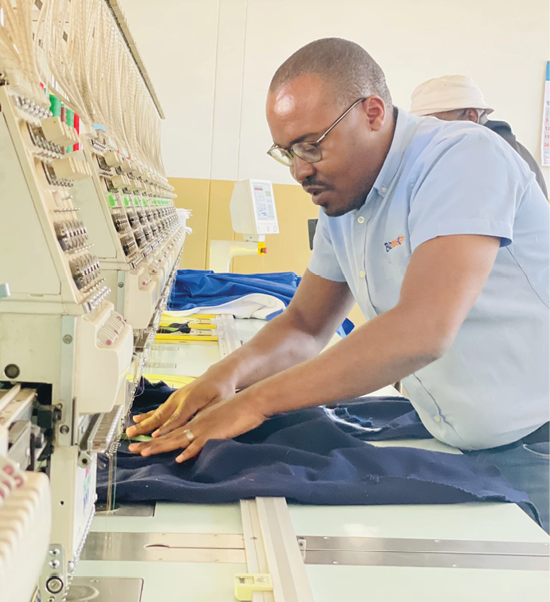
One business owner who has had to make a few adjustments over the years is Happy Shabangu (33) of Pretoria.
In 2013, Shabangu established his own business, Bizrocket Trade and Projects. The company started off as a branding, promoting and supply business.
“We were basically a printing shop,” he says.
Three years ago, he ventured into textile manufacturing to grow the business.
He specialised in the production of school uniform, corporate clothing and embroidery. Things went well until disaster struck with the outbreak of the Coronavirus Disease (COVID-19) pandemic.
During Level 5 of the national lockdown last year, companies like his could not operate because they did not provide essential services. This meant a loss of income for him and his employees.
“We started manufacturing general Personal Protective Equipment, including facemasks, so that our business could be allowed to operate,” he says.
The business was lucky to receive the COVID-19 relief fund worth R80 000 from the Small Enterprise Finance Agency. The money bought more sewing machines to meet the increased demand for cloth facemasks.
During the lockdown, the demand for school uniforms went down because the school calendar was interrupted. The business was thrown another lifeline when the Department of Small Business Development created a database of facemask suppliers across the country.
“We made it to the list and were able to get business from various clients. In some instances, we had to outsource other products like sanitisers for our clients. We stayed afloat as a business,” Shabangu says.
The biggest order the business has received has been for the manufacture of 44 000 cloth facemasks for Transnet, which the business recently completed.
The company has achieved great strides with only five permanent employees. Shabangu has proven that he’s a born entrepreneur, someone who is unfazed by challenges.
For more information call the Small Enterprise Finance Agency on 012 748 9600
Ethnic dolls Simply Beautiful
Ethnic dolls Simply Beautiful SiboneloNot being able to find a doll that represented her daughter’s heritage and culture inspired Meyerton entrepreneur Mmule Ramothibe Ka Pityana to create her own.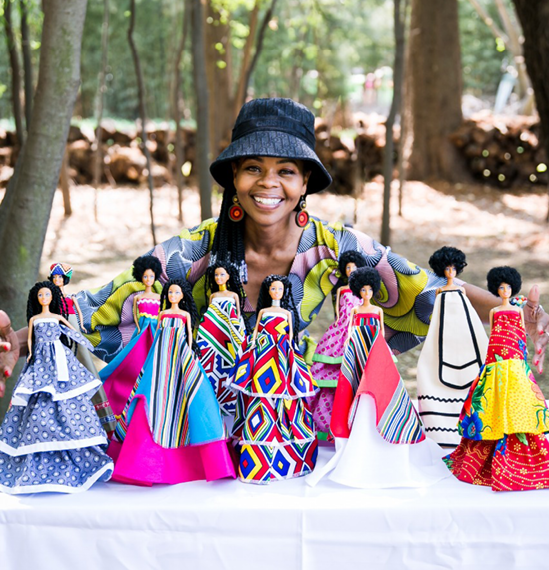
In 2012, she went looking for a doll for her daughter. Despite visiting numerous toy shops, she couldn’t find one. Her failed search gave rise to the birth to the Nandikwa Doll brand, Simply Beautiful, to address the shortage of ethnic like dolls in the market.
“Representation is vital for young girls growing up. It shows them that there are women just like them out there, thriving and that dreams can be a reality. Representation through play, especially with dolls, is changing more every day,” says Ramothibe.
She adds that it’s important for girls to have a toy that represents the person she is or hopes to be, be it dolls representing male-dominated careers, dolls with different body types or dolls with disabilities and from different ethnicities.
Simply Beautiful celebrates all South African cultures not previously represented by dolls, including Sesotho, Setswana, isiZulu, isiXhosa, Siswati, Tshivenda, Xitsonga, African, Khoisan and Muslim.
“Many see her as a toy, but Nandikwa is far more than that. We use the brand to tell our African stories. Each doll has her unique story of triumph, hope, perseverance, dignity, ambition, resilience, confidence and tenacity through education,” says Ramothibe.
While Ramothibe couldn’t find a local manufacturer to make the dolls, their clothes are all made by local seamstresses.
The dolls are approximately 30cm in height and ethnic doll-related accessories, such as other clothing options, are available. They are also available with an afro hairstyle, short curly hair and braided hairstyles.
“This is the fun part. To see and appreciate the versatility and uniqueness in the way children can wear their hair,” says Ramothibe. She plans to add to the selection of dolls, across different ethnic groups, and scale the brand throughout Africa.
For more information, visit www.nandikwadolls.co.za or connect on Instagram @Nandikwa_dolls.
Farmer gives food production a thumbs up
Farmer gives food production a thumbs up tsoanaRefilwe Manuel (26) grew up in a family of farmers. She was inspired to start farming at age 13 when her parents bought her broiler chickens.
Manuel realised from an early age that people need agricultural supplies if they are to eat three meals a day. She knew that this meant that she would never be out of work if she became a farmer.
She also took agriculture as a subject in high school and furthered her studies in primary agriculture after completing matric.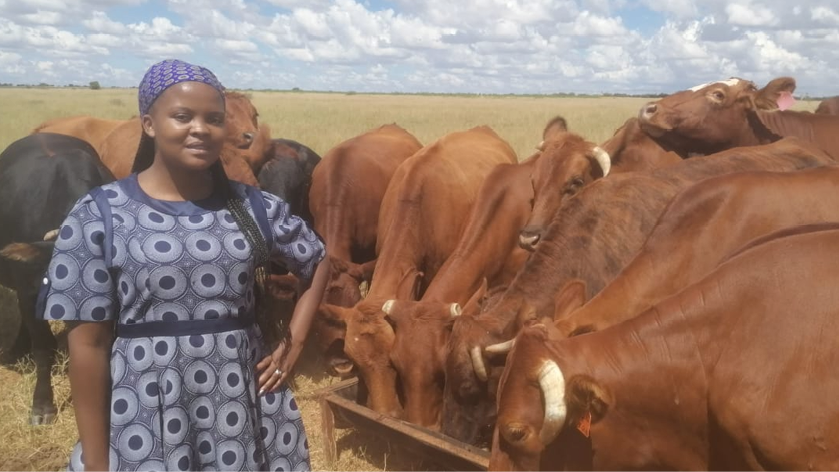
“In 2016, I attended the AVI Africa Conference, which is the biggest poultry conference and exhibition in Africa showcasing agricultural products. The conference gave me faith and added to my positivity,” she says.
As a child she was interested in being hands on in the family business. This lead Manuel start her own business in her teens."This came with a lot of challenges because of my age, as I could not get funding and support to grow my business. But I never stopped,” she says.
Today Manuel runs a successful farming business on Mooilaagte Farm in the Kagisano-Molopo Local Municipality.
Her business specialises in various livestock.
She has also partnered with her husband who specialises in crop farming.
Manuel sells her agricultural outputs to people across the North West province and at auctions.
In 2019, she received goats from the Department of Agriculture, Land Reform and Rural Development and was also among the young female farmers who received bulls as part of the department’s Sire Subsidy Scheme.
Farmers who benefit from the programme must;
• Own livestock;
• Have a business focus;
• Have an understanding of and passion for large stock production;
• Operate in some form of acceptable space, such as a farm or a communal area.
For more information about the Sire Subsidy Scheme, contact the Farmer Support Unit at 018 389 5111.
Farmer reaps rewards for excellence
Farmer reaps rewards for excellence UrsulaVutlhari Chauke (34) is a small-scale farmer with sky-high standards. The young Gauteng farmer runs VT Harvest, a Mogale City-based agribusiness that produces herbs such as fennel, coriander and wild rocket, as well as tomatoes, lettuce and spring onions. 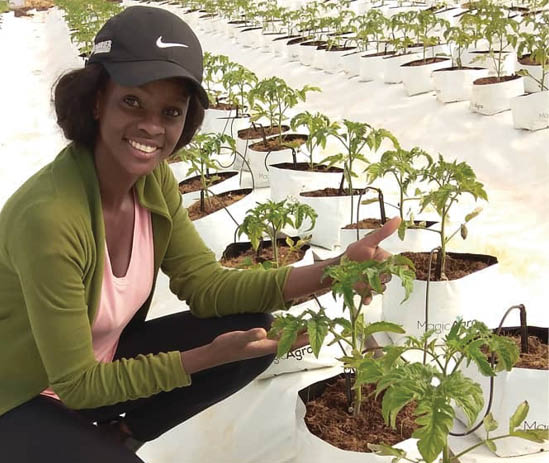
What sets her business apart is the fact that her crops are planted according to internationally approved health and safety standards. As a result, Chauke has earned GlobalG.A.P certification, a globally recognised farm certification scheme.
To receive the certification, Chauke has to ensure that she uses the right mixture of fertiliser, pesticides as well as other chemicals. She also has to keep meticulous records of the chemicals and fertilisers used to show to health and safety authorities.
“The GlobalG.A.P certification is pretty hard to get. The infrastructure required for it includes having hygiene areas, such as washing and toilet facilities, on your farm. “In addition, you must have a cold room to store the harvest. You must use refrigerated trucks to transport your vegetables."
Chauke’s produce is planted in 10 hydroponic tunnels that are soil-less and feature an irrigation system that runs automatically.
“Since I am not planting directly in the soil, I use the drip system of irrigation which enables me to have the right amount of irrigation,” Chauke says.
Her produce is of a high quality and clients are prepared to pay a little more for it. She supplies green grocers as well as McDonald’s outlets.
To make it in farming, Chauke tapped into her vast corporate experience. She has a tourism degree and a Master of Business Administration from the University of South Africa’s Graduate School of Business Leadership under her belt.
Chauke got support from the Gauteng Department of Agriculture and Rural Development, which gave her the hydroponic tunnels and 1.5 hectares of land to use.
“I have deliberately chosen high-value crops because I am using a small amount of space,” Chauke says.
The business also employs seven workers and seasonal workers during the planting and harvesting seasons.
For more information on GDARD support call 011 240 2500 or visit www.gauteng.gov.za/Departments/DepartmentDetails/CPM-001000
Food Basket initiative for Mpumalanga
Food Basket initiative for Mpumalanga UrsulaCrucial to South Africa's fight against poverty and unemployment is ensuring that people have food. 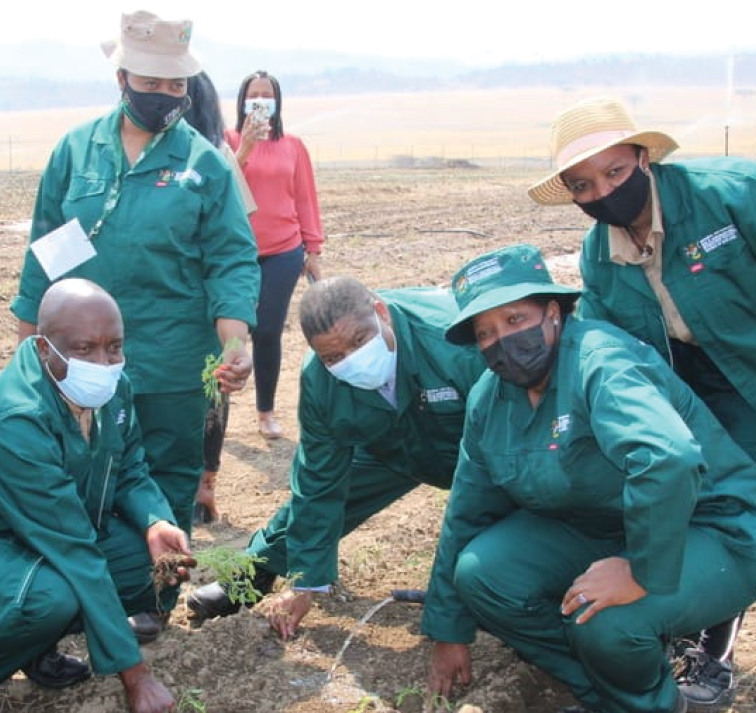
This led the Mpumalanga Provincial Government to launch the Agricultural Food Basket Initiative at the Siyancoba Community Project. The initiative seeks to improve food and nutrition security in the province’s vulnerable households in rural, urban and peri-urban areas amid the Coronavirus Disease (COVID-19) pandemic.
It is part of the provincial government’s Masibuyele Emasimini flagship programme, now called Phezukomkhono Mlimi, which uses vacant fields to fight hunger and poverty through food crop production.
The Siyancoba Community Project located at a Leeupoort Farm in Klarinet, was established through a donation of 700-hectares of land that is now used by a local community for food production.
It is expected that the initiative will create thousands of jobs for residents, especially women and youth.
The provincial government is providing infrastructure, production inputs, mechanisation support and training to residents.
According to Mpumalanga Premier Refilwe Mtshweni-Tsipane, over 300 residents are already involved in the two existing projects and close to 900 casual workers will benefit.
“This translates to job opportunities and income for families who do not have jobs. About 80% of the income that will be generated through the outputs from the initiative will benefit people who work in these agricultural projects,” she says.
The outputs will also be used to supply the National School Nutrition Programme. “The ultimate goal is to enter the international market and supply it with fresh produce from Mpumalanga,” the Premier says.
Fresh bread delivered to doorsteps
Fresh bread delivered to doorsteps UrsulaA young baker dreams of selling her bread and other baked goods countrywide. 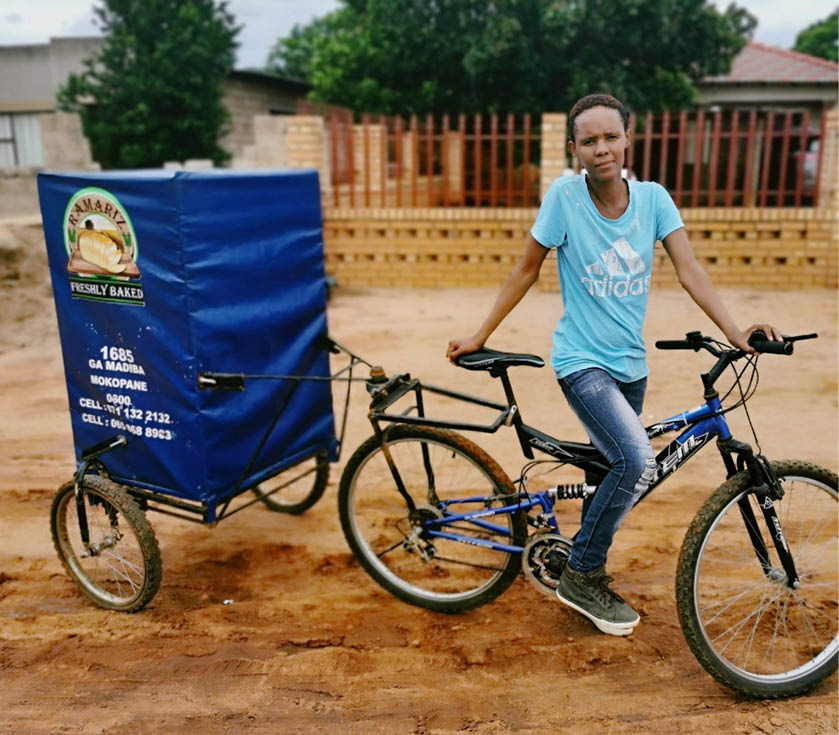
From selling loaves of bread, transported by wheelbarrow, to owning five delivery tricycles and employing 13 people, Ramasela Matsemela (34) is hungry for success.
Matsemela, from Ga-Madiba in Mokopane, Limpopo, owns Ramariz Bakery, which sells bread to the community, spaza shops and those selling kotas, and also delivers door-to-door.
Initially, Matsemela didn’t know how to bake, but knew that getting a job at a bakery would help her gain the skills.
She was not happy at the bakery, as she didn’t learn the skills she needed, so she quit and hired a professional baker to teach her at her home.
She started her business in 2019, after retiring from soccer.
“I was eager to create employment… I’ve always wanted to help people, especially with jobs,” she says.
When she started baking, Matsemela had to find a way to deliver her bread. This gave her the advantage over her competition, who only sold from their shops. She decided to use a wheelbarrow and later a bicycle.
“Our toughest challenge was when we had to push trolleys or ride bicycles in the rain. However, rainy days were our most successful days because people did not want to go out,” she says.
Matsemela prides herself on putting in extra hours when everyone else has gone home, and on her multi-skilled approach of baking, marketing and selling.
As for the future, she aims to own a building to house her bakery, employ more people and do a baking course.
“I want to see my bakery selling countrywide. I have pushed to get a building because we work at home in a garage that is now too small.”
Matsemela says her business has grown significantly and needs more space and a bigger oven.
Get your business off the ground
Get your business off the ground UrsulaStarting your own business is exciting. It means fulfilling a personal dream and creating employment for others. But startup entrepreneurs need to follow certain rules and regulations to avoid clashes with the law or losing their money.
Vuk’uzenzele spoke to Mpumelelo Zikalala, an attorney at Zikalala Attorneys, about some legal considerations before establishing a business. Zikalala says there are three key areas to understand.
1. Regulatory role
You need to register your business with the Companies and Intellectual Property Commission (CIPC), a government agency responsible for the registration of any company in the country. Entrepreneurs can seek counsel from the agency on what compliance measures they need to take.
“There is no need to register a (PTY) LTD company if you will be selling chicken dust in a corner of your neighbourhood, because you simply buy meat, braai it and sell directly to the customer.
“But if you have grown your business and want to trade with other businesses or offer your service to big clients, you may need to register as a (PTY) LTD. Other businesses are likely to require that your enterprise be properly registered," he explains.
2. Compliance role
Some businesses require a licence or permit before trading can start. Some of these permits need to be renewed frequently.
“For example, a liquor business requires you to have a licence. Find out about the type of licence you need, the institution that issues it and the costs of getting it,” says Zikalala.
3. Relationship/stakeholder management
There are internal and external relations an entrepreneur needs to consider. If there are business partners, any contracts signed need to be clear on who does what and what happens if they do not meet their obligations.
Externally, customers need to know their obligation and that of the entrepreneur.
“Be clear about the service or product you offer and how much they need to pay you. The same applies to suppliers.
Understand what the contractual agreements are, the costs involved and penalties for non-delivery."
4. Seek legal assistance
Zikalala also urges emerging entrepreneurs to seek legal advice as they embark on their business journeys.
He says there are government and non-governmental entities such as the CIPC and the Small Enterprise Development Agency that can assist with starting a business.
“Entrepreneurs can also approach a private attorney for help,” he says.
For more information call the Companies and Intellectual Property Commission on 086 100 2472or the Small Enterprise Development Agency on 0860 663 7867
Given Ngwamba makes charcoal from organic waste
Given Ngwamba makes charcoal from organic waste UrsulaGiven Ngwamba (35) from Naas in Mpumalanga didn’t think he would struggle to find employment after completing his sound engineering diploma at the National Electronic Media Institute of South Africa, but life had other plans. 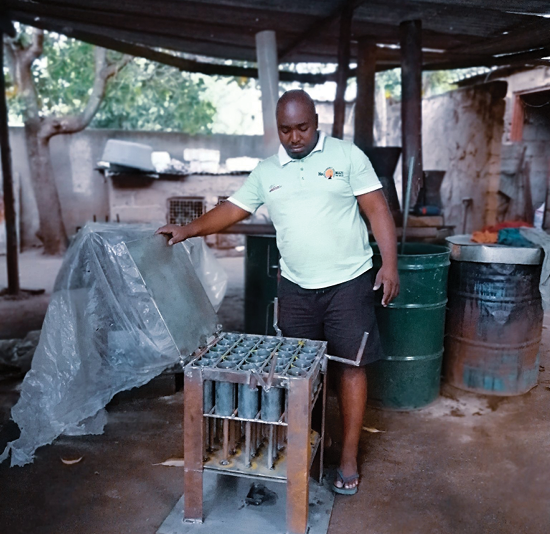
While battling to make ends meet, Ngwamba came up with the idea of making and selling charcoal through his business Ndzilo Charcoal.
“I was at the back of my house and thought ‘let me try charcoal’. I had seen some people buy it and thought I could get into the business. Making charcoal was not new in our area because residents rely on it to cook during power cuts,” he explains.
Doing research, he found that there is a more sustainable way to create coal using agricultural waste, such as ground nuts, sugarcane, macadamia shells, coconut and waste from mango leaves and banana trees.
“I experimented with waste from my backyard. I carbonised the waste and, after much trial and error, finally made a machine that helped me create doughnut-shaped sustainable charcoal .
Ngwamba’s product produce less smoke and catch fire easier.
Stock now in stores
Starting a business from scratch had its challenges.
“A lack of financial backing meant I had to make my own machine, with a welder. I didn’t have transport and had to use a wheelbarrow to collect waste from nearby farms.”
In 2019, Ngwamba got a break when the Indaba Inclusive gave businesses in the green space a chance.
“They accepted my application. I went on a business boot camp in Polokwane and got a grant to better my model.”
Gradual sales to friends, family and his community gave Ngwamba the confidence to approach the local Pick n Pay to stock the charcoal.
“Local and big businesses loved it. We are also in talks with another local market to have my product on their shelves.”
Ndzilo Charcoal now produces 200kg of charcoal a day, using about five big drums. This is a far cry from its initial 20 briquettes a day, says Ngwamba.
Contact Ndzilo Charcoal at 082 544 0882 or follow on Facebook @Ndzilo_Charcoalbriquettes.
Khethiwe Maseko is a plucky entrepreneur
Khethiwe Maseko is a plucky entrepreneur UrsulaOnce a domestic worker, Khethiwe Maseko (32) is now growing her own poultry business. 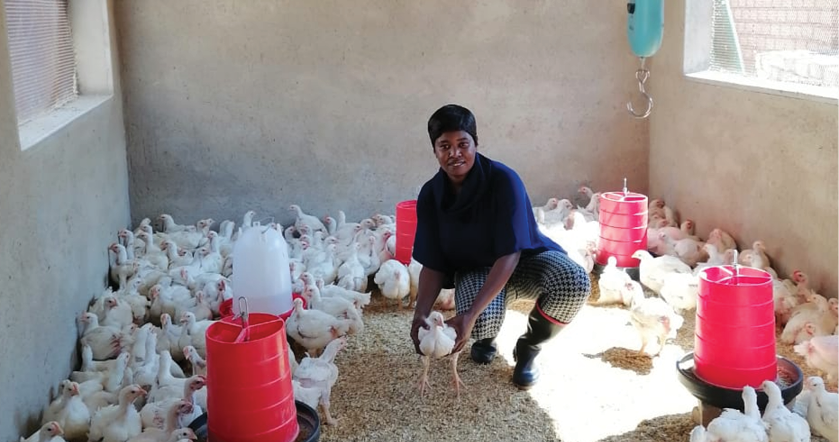
Maseko, from Ekangala in Pretoria, is the owner of Gugulam Poultry House. She started in January 2018 with only 50 chickens.
Her business has grown and she is now producing 300 chickens per cycle.
“I raise broiler chickens from one day old, until they are ready at six weeks. The increase in production has been an impressive improvement. I now want to get into major commercial farming, as I have grown through experience,” she says.
In 2017, Maseko attended the Am I Preneur business development programme, offered by the Gauteng Provincial Government and sponsored by Sasol.
The focus of the programme was acquiring business skills and developing an entrepreneur’s mindset.
“During training, the idea of a poultry business came to me. After the training, I implemented the idea. I saw there was a gap in the market for fresh farm chickens, and an opportunity to start small,” she explains.
The programme gave Maseko seed funding of R15 000, which she used to buy equipment.
The business today
Thanks to support received from the National Youth Development Agency (NYDA), Maseko was able to build better accommodation for her chickens.
“In the shack, I struggled with a high mortality rate and it leaked when it rained. The funding helped a lot,” she says.
Maseko supplies live and slaughtered chickens to households in her community.
“My space only allows me to grow 300 chickens per cycle. This is not enough to meet the demand.
"I am also working on increasing supply to other segments, like shisanyama, restaurants, churches, schools and resellers."
She says her longterm plan is to lease a farm and expand her business.
The NYDA Grant Programme provides funding for South Africans aged between 18 and 35. For more information, call 087 158 6345/5738 or visit www.nyda.gov.za.
Make sure you have a will!
Make sure you have a will! tsoanaIf you don’t have a valid will, you will have no control over who inherits your assets when you die. This might lead to people inheriting your money or assets, even if you didn’t want them to.
If a person dies without making a will, the assets that they owned will be distributed in terms of the Intestate Succession Act, to the people who must rightfully inherit them.
The Act sets out rules of how the estate must be distributed. It goes to close relatives first, in a specific order:
- If you are survived by only a spouse, the spouse will inherit the entire estate.
- If you don’t have a spouse and are only survived by your children, they will inherit the estate in equal shares.
- If you are survived by a spouse and children, the spouse will receive a child’s share or R250 000, whichever is greater, and the children share the balance. For example, if the estate is worth R2 million and the deceased is survived by a spouse and three children, a child’s share amounts is R500 000. The child’s share is calculated by dividing the value by four.
- If you have no spouse or children, but both your parents are alive, they will inherit the estate in equal shares. If one parent is dead, but left siblings, the surviving parent will inherit half of the estate and the deceased parent’s descendants will receive the other half.
- If both of the deceased’s parents have died, but they left descendants, the estate is split into equal parts.
- If the deceased does not leave a spouse, descendants, parents or parents’ descendants, the nearest blood relation will inherit the entire estate.
- Finally, if the deceased is not survived by any relative, the State will inherit the proceeds of the estate.
In addition to the above, a child born out of wedlock can inherit from both blood relations; and an adopted child is deemed as a descendant of his adoptive parent or parents.
When is a will valid?
A will is only valid when made by a person 16 years or older, and must meet the following requirements:
- It must be in writing, and your signature must appear on every page and at the end.
- It must be signed in the presence of two or more competent witnesses. Any person 14 years and above can be a witness. An heir can’t be a witness.
- You must include full details of your assets and who you want to leave them to, including their names and details.
- You must nominate a person to manage your estate (the executer). This person can’t be an heir.
- You must state what should happen to a minor beneficiary’s inheritance.
- If you are the sole guardian of a minor child, indicate who should be appointed as the child’s guardian.
- You must ensure the original signed will is kept safe, because a copy is not valid.
Information supplied by the Office of the Ombud for Financial Services Providers as a member of the National Consumer Financial Education Committee.
Mashigo finally hatches success
Mashigo finally hatches success UrsulaLebogang Mashigo (30) of Mandlethu village in Mpumalanga is a resilient farmer who has seen it all. 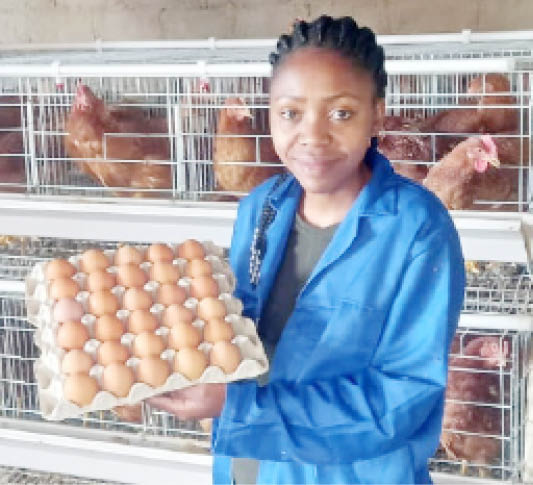
In the past 10 years she tried out a number of businesses before successfully running her current egg producing, packaging and distributing business.
She is the owner of Eggselent, a business she started in 2019 with just R350. Initially, she bought 12 trays of eggs from a popular farm in Middleburg and sold them to customers.
Today her business sells freshly laid eggs.
Her fortune changed when she received an order for bulk orders and she invested in layer cages. “A friend of mine sponsored me R2 000 and I bought 20 laying chickens,” Mashigo says.
Since then, she has not looked back. Last year, she built a bigger chicken house to accommodate at least 600 layers.
Eggselent supplies businesses such as bakeries, bed and breakfast establishments and ordinary households. Customers can also buy eggs online.
“At the moment we deliver between Siyabuswa, Kwaggafontein and KwaMhlanga areas in Mpumalanga using the e-commerce platform,” she says.
In 2020, Mashigo received a grant worth R50 000 from the National Youth Development Agency (NYDA). She used the money to buy 300 layers. The NYDA also provided her with a business mentoring opportunity.
She also received a R20 000 grant from Thembisile Hani Local Municipality and COVID-19 relief funding from DJ Sbu worth R20 000 that went towards its business development programme.
Mashigo has so far created jobs for two people in her area.
“I owe my success to a number of failed business ventures I previously tried out. I have also tried network marketing, informal businesses and tried to run a non-profit organisation. All that experience makes me the entrepreneur I am today,” she says.
Her business plays a role in fighting poverty. “We are securing food in the community because residents can access fresh eggs at an affordable price,” she says.
For more information on NYDA funding, contact the NYDA at 087 158 6345 / 5738 or email: info@nyda.gov.za
Meet the Mopani worm queen
Meet the Mopani worm queen UrsulaWhen Phuti Kabasa (36) decided to add flavour to the mopani worms she was selling, she found a recipe for business success. 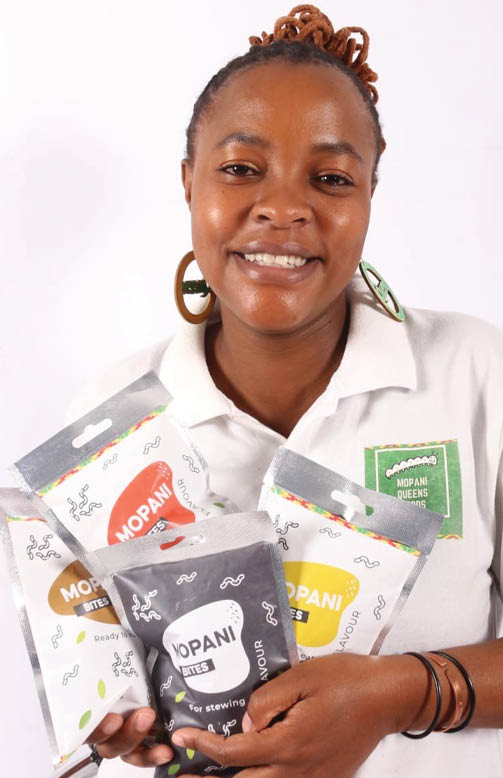
In 2018, Kabasa needed to supplement the income of her household in Pretoria West. She found herself selling mopani worms and this is how her business, Mopani Queens began.
But she went a step further by adding a range of flavours to her mopane worms, resulting in a delicious snack that is a favourite among her customers.
“I started experimenting with flavours. I shopped around for sauces and drying technologies. I wanted to make mopane worms more interesting and accessible for people who do not know how to cook them,” she explains.
Kabasa ended up with three flavours, - peri-peri, barbeque and chutney.
She says the flavoured mopani worms offer the same nutrition as the traditional ones. “Traditionally, mopani worms are served with pap as a meal. My business is modernising this food by turning it into a snack,” she explains.
Kabasa has figured out her target market well. “While I sell to everyone, I mostly target customers looking for alternative sources of protein found in indigenous foods.”
She also services nutrition conscious people, especially sports people. “Mopani worms are rich in protein and are affordable,” she says.
Kabasa started producing and packaging Mopani Queens in her family kitchen. She recently bought a wendy house which is now her workstation.
Like many other businesses, when Mopani Queens started sales were slow. However, that changed when Kabasa started marketing the busines online and on social media.
Kabasa has even bigger dreams for the business. She plans to sell other natural foods, such as insects. She strongly believes that in the future insects will be a more viable source of protein than traditional meat.
For more information call Mopani Queens on 063 802 4194.
Offender encourages COVID-19 vaccination
Offender encourages COVID-19 vaccination UrsulaSiyanda Ngwenyama (37) says the spread of fake news about Coronavirus Disease (COVID-19) vaccines is dangerous and can affect lives, especially when read by people with a limited education and limited access to factual news. 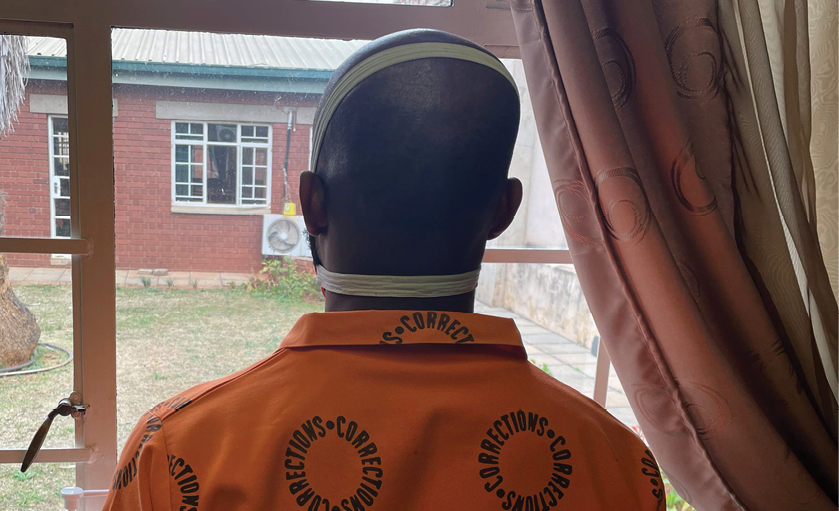
Ngwenyama is serving a 22-year prison sentence at Kgosi Mampuru II Correctional Centre in Tshwane. He was arrested for house robbery, hijacking, attempted murder and possession of stolen property. His sentence started in December 2020.
He is one of the offenders who have vaccinated against COVID-19.
“I was vaccinated with the Johnson & Johnson vaccine. I consented to get vaccinated because I have lost people very close to my heart due to COVID-19. I do not want to die a Correctional Centre,” he says.
Ngwenyama did not experience any side effects, except for feeling dizzy for a few minutes after getting the jab.
“I lost two siblings to COVID-19 in September 2020, and one of my closest friends, who is locked up in a maximum-security Correctional Centre, also got infected. I know this virus can take my life if I do not do what is needed to fight it,” says Ngwenyama.
The roll-out of vaccines at the correctional centre started in July 2021, and Ngwenyama was among the first offenders who took the jab.
Ngwenyama worries that the spread of vaccine fake news is what leads many people to doubting their effectiveness and safety.
“As offenders, sometimes we debate issues affecting society, such as COVID-19. It is scary to hear how many people actually believe that vaccines are meant to kill us.
“This makes many people sceptical about taking the vaccine, which means it will take time for us to win the fight against the pandemic,” he says.
He calls on everyone to get vaccinated to save their own life and those of their loved ones.
“You cannot be forced to take the vaccine if you do not want. Please think about how many people have died so far. Ask yourself if you can survive this deadly virus. Get vaccinated,” he says.
Orefile Mthombeni blazes a trail in aviation
Orefile Mthombeni blazes a trail in aviation UrsulaOrefile Mthombeni is one of the people in the aviation space who ensures that an aircraft is safe before it carries passengers. 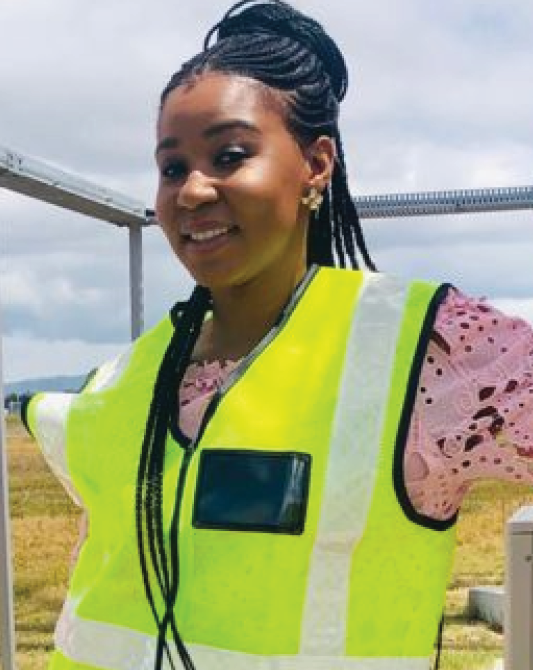
She is the technical standards specialist at State-owned company Air Traffic and Navigation Services (ATNS).
Originating from Bloemfontein, Mthombeni leads a team of people who are responsible for checking if all safety procedures have been followed before passengers aboard an aircraft.
At age ,30, she is also the first women to hold this position within ATNS.
The ATNS provides air traffic, navigation, training and other related services to South Africa as well as 10 percent of the world’s airspace.
“My job is basically to assure safety through technical audits and technical investigations on our communications, navigation and surveillance (CNS) equipment.”
Mthombeni says CNS equipment are used to guide aircrafts on the route to be taken in the sky.
Furthermore, she also helps investigate failures of this systems and provides recommendations.
Paving the way to aviation
Mthombeni advised high school pupils who are interested in her field of work to take on subjects such as Mathematics and physical science at high school level.
This will pave the way for a career in Electrical Engineering at a University of Technology or a Technical, Vocational Education and Training (TVET) college.
“You will then be required to complete practical experience for your Diploma at the Aviation Training Academy and get employed by ATNS for a minimum of five years,” she says.
Mthombeni joined ATNS in 2012 through the Aviation Training Academy (ATA), where she completed practical experience for her National Diploma in Electrical Engineering (Light Current).
She also holds a Bachelor of Technology in Business Administration and she is currently studying towards a Bachelor of Commerce with the University of South Africa.
For more information, you can contact the ATA on 011 570 0400 or visit ATNS website: www.atns.co.za/com
Otsile Kgomo grows food security
Otsile Kgomo grows food security tsoanaOtsile Kgomo (23) is driving change in his community by teaching people how to produce their own crops.
Kgomo, from Makapanstad in the North West, owns Bakone Balemi Evergreen, a registered non-governmental organisation (NGO) that produces vegetables to sell to local markets.
He also started two community-based programmes called Bakone Setshabeng and PlantEdu. The two initiatives educate communities about growing a small-scale crop business.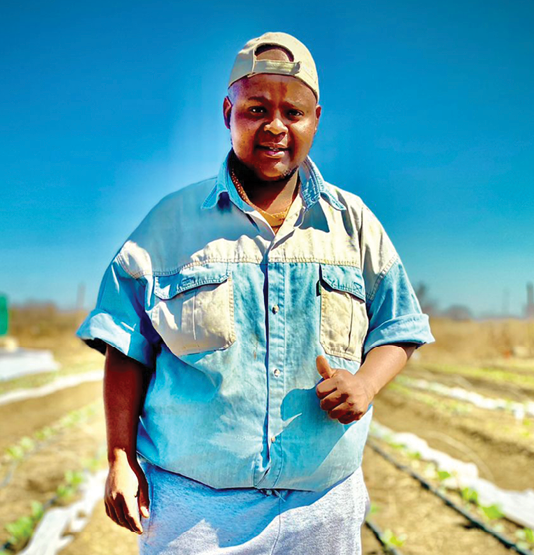
Bakone Setshabeng sees Kgomo and other mentors visiting selected participants to equip them with crop production knowledge. “We also introduce them to new ways of producing. This helps them learn how to get their produce to the market, which leads to independence and the creation of jobs,” he explains.
In the PlantEdu Programme, Kgomo and his team visit schools to teach learners about the fundamentals of agriculture. “We teach youngsters so that they can grow up with knowledge of agriculture. We also cultivate passion in those who are already interested in farming,” he says.
The organisation runs both of its programmes in Soshanguve. “At Thutong Secondary School, we identified 10 less fortunate learners to receive vegetable packs on weekends. In Soshanguve Block XX, 23 households are beneficiaries. Formal and informal training, seeds and fertilisers are provided.”
Beneficiary Joyce Selwane is grateful for the programme. “It has really helped me and my family during the Coronavirus Disease pandemic, as I lost my job as a cleaner. The programme helped us produce food,” she says.
A passion for agriculture
Kgomo says his passion for agriculture motivated him to make a success of his organisation.
He also holds a National Diploma in Agricultural Crop Production from the Tshwane University of Technology.
“Before I obtained my diploma, I decided to volunteer for a year in an organisation called Green Awareness in the North West. This is where my love of agriculture began.”
Working for Green Awareness allowed Kgomo to partner with farmers and other professionals, and to develop a green awareness campaign in the community.
After completing his studies, he got an opportunity to be part of an internship at the Department of Correctional Services in Baviaansport.
“The money I received from the internship, savings and marginal income from harvesting small produce is how I started Bakone Setshabeng and PlantEdu.”
He says both programmes are sustained by the income he receives from harvesting and selling his produce.
For more information call Bakone Setshabeng and PlantEdu on 076 272 6732.
Partnerships tackle gangsterism
Partnerships tackle gangsterism tsoanaFormer gang leader Welcome Witbooi (38) has warned parents to monitor their children closely and spend enough time with them to keep them away from gangs.
“It’s the small details parents must pay attention to. Suddenly coming home late is one of the critical signs. If your child is suddenly buying a cell phone or sneakers, you should be concerned and take immediate action,” he says.
Witbooi joined a gang at the age of 12. He says when The Firm, a gang that no longer exists, was recruiting him, it offered him the promise of a family structure.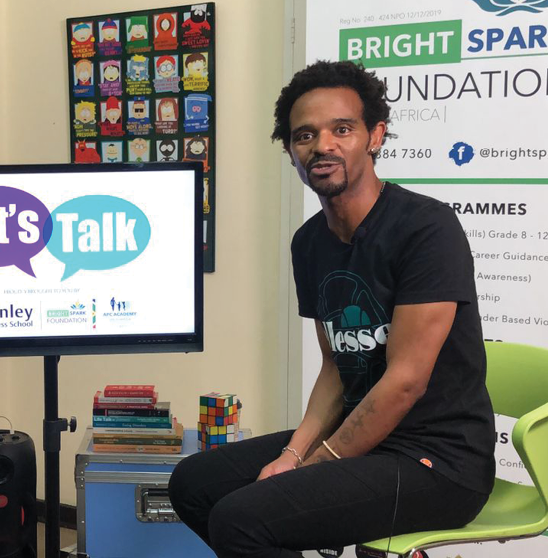
Witbooi came from a single grandmother-headed home.
“Before the gang recruits you, they know your family situation. If a parent interacts with their children, the gang can’t influence the child,” says Witbooi, who has formed BrightSpark Foundation SA to help youth stay away from gangs.
Adults play a crucial role in ending gang activity in their neighbourhoods.
Western Cape Anti-Gang Unit (AGU) Acting Commander Colonel Karl Wienand says the unit has formed partnerships, through community engagement programmes, to curb organised crime in the province.
The AGU engages with community members, non-governmental organisations that fight social ills, such as drug use.
The organisation also works with community policing forums and neighbourhood watches.
“This helps us learn about the areas and individuals we should be looking at. In cases where people are not able to speak freely, they contact us directly and we meet them in a discreet and secure manner,” Wienand says.
The unit has 189 members conducting operations in the Western Cape, 132 in the Eastern Cape and 78 in Gauteng.
The AGU has also formed strong partnerships with various law enforcement bodies, including the Asset Forfeiture Unit, National Prosecuting Authority and the SAPS’ Detective Services. Together they have seized guns used by drug dealers.
Community members can report crime at the nearest police station or by calling 10111. To contact the Western Cape AGU, call 071 673 1615. To contact the BrightSpark Foundation, call 064 384 7360.
Passion for pedicures turned to business
Passion for pedicures turned to business tsoanaWith no education in cosmetology, somatology or cosmetic formulations, Shantelle Booysen used her love for pedicures to create products that are now being exported to 34 destinations. She also employs about 2 500 people in the country.
Her multimillion-rand company was one of the first South African companies to successfully register its skin care range with the United States of America Food and Drug Administration Agency, the Ministry of Health in India and the European Union.
Using active ingredients in the Elim Spa Products for hands, feet and body, Booysen has designed innovative systems that guarantee results.
“I developed a new system for pedicures. At the time and still today we have been copied nine times in South Africa, which is a good thing because when people copy you it means you are doing something right.
When people pick up my product, I want them to know the product works and can be trusted,” says the founder and CEO of Elim Spa Products.
Elim Spa Products was established in 2004 when Booysen wanted to solve a problem she experienced after getting a pedicure.
“I loved a pedicure; the thing that irritated me was my feet were slippery in my shoes afterwards. I didn’t like that so I went to a cosmetic formulator and I asked them to create a heel cream that would stop my feet from being slippery,” she says.
Working with the cosmetic formulator, they produced a heel cream that guaranteed no slipping after a pedicure, had a pleasant scent and softened the heels.
Seeing the amazing results after using the product, Booysen sold it to a company, which at the time had 27 spas in the country. It did not take long for the company to introduce the product to its branches on the continent.
In the early days of her business, Booysen was assisted by the Small Enterprise Development Agency (SEDA) with the development of her website and marketing material. She also received financial training.
Later on, through the agency’s Technology Transfer Fund, the business was able to purchase a sophisticated machine that could package individual sachets of the products.
Finding its footing
In addition, SEDA assisted the company with access and the support to export freely to Germany, Greece, Spain and Holland.
“SEDA came in with a massive financial investment. It is extremely expensive to export to Europe. There was no way I could afford to do that in the beginning without their assistance,” Booysen says.
With the many obstacles that entrepreneurs face when establishing a business, government has committed to support small, medium and micro enterprises (SMMEs) and cooperatives through funding initiatives, business development and support services.
Government supports SMMEs and cooperatives through entities such as SEDA, Industrial Development Corporation, Small Enterprise Finance Agency, National Empowerment Fund as well as Finfind.
This forms part of government’s effort to create jobs and an inclusive economy in a country that has a challenge with unemployment.
Staying afloat
When the world was hit by the COVID-19 pandemic last year, South Africa went into a nationwide lockdown in an effort to curb the spread of the virus and save lives.
At the time, salons had to close their doors and sectors that were identified as essential services were the only ones allowed to operate.
To make up for the money the business was losing while salons were closed, Booysen focused on earning foreign currency to pay service providers, ensure the company’s supply chain and salaries.
“Everyone came together because they wanted to have a job after the pandemic. We have an overcomer mentality in the organization and we always make a plan. My team worked from home and we sold to countries that were open,” Booysen says.
Her accolades include being awarded the Western Cape Entrepreneur of the month award in 2015. In the same year, she also won the National Gazelle Award, which is an award for the 40 most promising, high-potential entrepreneurs in South Africa.
Elim Spa Products are also part of the National Gazelles programme, receiving constant mentoring and interventions from SEDA.
For information on receiving assistance from SEDA call 0860 663 7867 or email info@seda.org.za - SAnews.gov.za
Protect yourself against electoral fake news
Protect yourself against electoral fake news tsoanaThe Independent Electoral Commission (IEC) is making sure that voters are not misguided by disinformation.
Disinformation can constitute hate speech or incitement to violence against certain groups in the society.
To fight against digital disinformation, the IEC has turned to The Real 411 website to allow members of the public to report instances of digital misinformation about the upcoming local government elections that are scheduled to take place on 1 November 2021. The website is https://www.real411.org and anyone can access it.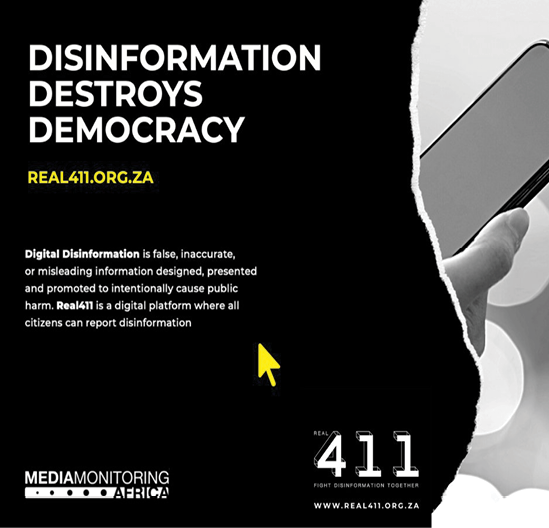
Disinformation is defined as false, inaccurate or misleading information designed to cause harm. Through the website, members of the public can report four types of digital offences: disinformation, hate speech, incitement to violence and journalist harassment.
“The digital disinformation reporting platform forms part of the work of the Directorate of Electoral Offences. The directorate was established ahead of the 2019 National and Provincial Elections to investigate alleged breaches of the Code of Conduct and prohibited conduct,” the Commission says.
The Commission came up with this innovative website due to rise in disinformation, especially through digital platforms, and its potential impact on elections.
The platform was developed in conjunction with Media Monitoring South Africa, a non-governmental organisation that focuses on promoting independent, accurate and impartial reporting on elections.
Complaints will be considered by a panel of experts, including those with expertise in media law, social and digital media.
The panel will make recommendations for possible further action by the Commission.
The action could include:
• Referring the matter for criminal or civil legal action.
• Requesting social media platforms to remove the offensive material.
• Issuing media statements to alert the public and correct the disinformation.
Complaints relating to alleged breaches of the Code of Conduct must be submitted to the Electoral Court or the Directorate for Electoral Offences.
The Secretary of the Court Annerie Vorster can be contacted by email: Avorster@sca.judiciary.org.za / Annerievorstersca@gmail.com or call 051 492-4665.
The Electoral Commission’s Directorate for Electoral Offences can be reached via email at legalservices@elections.org.za
Rehab for children with genetic disorders
Rehab for children with genetic disorders SiboneloWhen Sihle Msimango (11) was born with hemiplegic cerebral palsy it was thought she would never be able to walk. Hemiplegic cerebral palsy affects motor abilities and muscle tone on the body.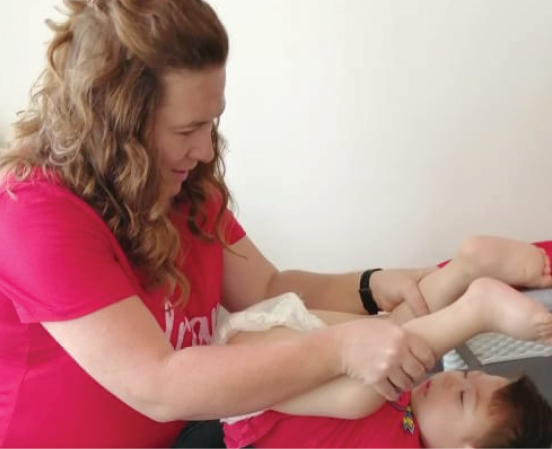
Msimango’s plight was changed when she started receiving The Anat Baniel Method (ABM) of Neuromovement treatment. The 11-year-old from Soweto can now walk around her home without crutches.
The ABM is a method of therapy that uses brain cells that are not damaged to take over the functions of the damaged ones.
Sihle’s father, Eddy Msimango, says his daughter started Neurogenesis therapy with the Red Balloon Foundation in October 2018. At the time she had been using a wheelchair.
“Her therapist stimulates her through gentle movements that help her brain to communicate with her body. On 13 April 2019, she started to slightly walk around the house..”
The Red Balloon Foundation is a non-governmental organisation (NGO) that helps underprivileged children who are diagnosed with autism, cerebral palsy, attention deficit hyperactivity disorder, cortical visual impairment (CVI), stroke, brain injury and other genetic disorders.
The NGO was started in 2017 by Antoinette Harvie in memory of her late son, Maxim, who was born with a severe in-utero infection that led to him being diagnosed with quadriplegic cerebral palsy and cortical visual impairment (CVI).
Harvie says they have managed to organise more than 800 therapy sessions, at the Charlotte Maxeke Johannesburg Academic Hospital, for the 14 children they are funding. They are planning to add eight more children next year.
“We raise funds and organise ABM Neuromovement with therapists and psychologists sessions for 14 children like Sihle. With Sihle there has been a marked improvement on her school grades in addition to the physical development,” Harvie says.
The NGO also organises training sessions for parents on how to continue the treatment for children. Harvie says they bring in ABM Neuromovement experts from Canada to teach the local therapists and parents.
In addition, they have special training for parents on how to help children who have been diagnosed with CVI, a disorder caused by damage to the parts of the brain that process vision.
For more information on the work of the Red Balloon Foundation email info@theredballoonfoundation.org.za or visit www.theredballoonfoundation.org.za.
SA to roll out vaccine certificates
SA to roll out vaccine certificates JoyPresident Cyril Ramaphosa has announced that the Department of Health will soon roll out a vaccine certificate as proof that residents have been vaccinated against the Coronavirus Disease (COVID-19).
 Addressing the nation recently, the President said the digital pass system could be used to show vaccination status to facilitate travel, access to establishments, gatherings and other forms of activity.
Addressing the nation recently, the President said the digital pass system could be used to show vaccination status to facilitate travel, access to establishments, gatherings and other forms of activity.
“Our approach is informed by World Health Organisation guidelines and is in line with international best practice. Streamlining and standardising proof of vaccination will also go a long way towards getting a number of international travel restrictions both from and into our country eased,” he explained.
The President also announced that the country would move from Adjusted Alert Level 2 to Adjusted Alert Level 1 after it exited the COVID-19 third wave.
“Getting vaccinated is not only about protecting yourself and those around you; it is also about preventing new and more dangerous variants from emerging.
The virus can spread and mutate in unvaccinated populations,” President Ramaphosa said.
However, he urged South Africans to continue to adhere to the basic precautions to limit the spread of the virus, even if they have vaccinated.
Economic recovery
President Ramaphosa said the country’s priority is economic recovery to make room for job creation and help businesses hard hit by the pandemic get back on their feet.
“The only way that we can do this is if more South Africans choose to get vaccinated, more quickly.
“If the majority of our population is vaccinated, we can declare South Africa to be a safe destination and welcome tourists back over the summer season.”
He added that the only way for the country to resume sporting events and concerts, lift restrictions on restaurants and bars, and facilitate the safe return to workplaces, shops and public spaces.
“If we can reach our vaccination targets by the end of this year, we can avoid further restrictions and kick our economic recovery into high gear,” he stressed.
Alert Level 1
The President said the current trends in the progression of the pandemic mean that a number of the restrictions in place can be eased, as per the recommendations of the Ministerial Advisory Committee on COVID-19.
The following measures will apply as part of adjusted Alert Level 1:
- The hours of the curfew have changed, from 12 midnight to 4am.
- Non-essential establishments like restaurants, bars and fitness centres are closing by 11 pm to allow their employees and patrons to travel home before the start of the curfew.
- The maximum number of people permitted to gather indoors has increased from 250 to 750, and the maximum number of people permitted to gather outdoors has increased from 500 to 2 000.
- Where the venue is too small to accommodate these numbers with appropriate social distancing, then no more than 50% of the capacity of the venue may be used. This includes religious services, political events and social gatherings, as well as restaurants, bars, taverns and similar places.
- The maximum number of people permitted at a funeral has moved from 50 to 100. Night vigils, after-funeral gatherings and ‘after-tears’ gatherings are not allowed.
- The sale of alcohol – for both off-site and on-site consumption – has been permitted, according to normal licence provisions. However, no alcohol may be sold after 11 pm.
- The wearing of masks in public places is still mandatory, and failure to wear a mask when required remains a criminal offence.
Saving lives
As of 4 October 2021, over 18 million vaccine doses have been administered since the beginning of the vaccine rollout in May 2021.
This also means that from May 2021, there is a total of about 8.6 million people who are fully vaccinated. This is also more than one-fifth of the adult population.
The President said the numbers give confidence and hope especially since government has set a target of vaccinating 70% of the adult population in South Africa by the end of the year.
“If we reach this target, the Department of Health estimates that we could save up to 20 000 lives.
“That represents 20 000 people – mothers, fathers, sons and daughters – whose death can be prevented if the majority of us choose to get vaccinated,” the President said.
He emphasised that to reach the national goal, South Africa needs to administer an additional 16 million vaccine doses this year, which amounts to around 250 000 first dose vaccinations every single workday of every week until mid-December. – SAnews.gov.za
Sasol and government join forces to fight COVID-19
Sasol and government join forces to fight COVID-19 Sibonelo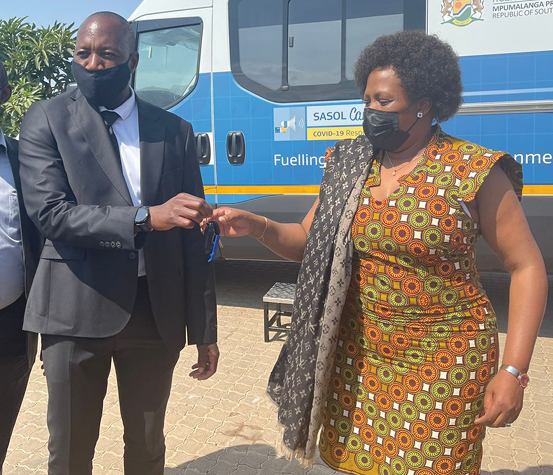 Government can only successfully address severe challenges that affect communities, such as the Coronavirus Disease (COVID-19) pandemic, when it receives help from business and social partners.
Government can only successfully address severe challenges that affect communities, such as the Coronavirus Disease (COVID-19) pandemic, when it receives help from business and social partners.
A case in point is Sasol Limited’s recent donation of COVID-19 medical equipment and a mobile science laboratory to the Mpumalanga Provincial Government.
The donation was received by Mpumalanga Premier Refilwe Mtshweni-Tsipane at Nhlazatshe Clinic, in Elukwatini in the Gert Sibande District. Three mobile clinics, nine vaccine cold storage freezers, four vaccine cold storage fridges, 30 vaccine carriers and 30 temperature loggers were donated.
“These contributions will significantly boost the number of vaccines that we are able to administer across the district municipality, while also preserving the longevity of the vaccines,” the Premier says.
The investment by Sasol will assist concerted efforts to achieve immunity in the province by the end of this calendar year, she adds.
Sasol Operations and Assets Senior Vice President Simon Baloyi encourages residents to get vaccinated and assures them that vaccines are safe.
The donation was made possible by a Memorandum of Understanding entered into between the provincial government and Sasol in 2019. Sasol has actively empowered communities in the province as a result.
“Early in July, as part of our efforts to increase the rate of COVID-19 vaccination uptake in the Gert Sibande District, we reached out to Sasol and requested that it avail facilities to supplement our vaccination sites across the district.
“Sasol duly availed a facility, with the capacity to vaccinate 19 000 direct and indirect Sasol employees,” the Premier says.
“Following the launch of this initiative, the rate of vaccinations in the district increased significantly and we have fully vaccinated over 160 600 people in the district,” she adds.
One of the most significant challenges that communities face is lessening the impact of COVID-19 on the quality of education, the Premier says.
Prolonged absentism from school have worsened the challenges facing the education sector in promoting science, technology, engineering and mathematics.
To address this challenge, Sasol also donated a mobile science laboratory to the provincial government.
“This laboratory is capable of servicing around 1 200 learners in grades 10 to 12, while also supporting the existing learner support programme that targets nine schools across the Chief Albert Luthuli Municipality,” the Premier says.
Stay safe
Stay safe Sibonelo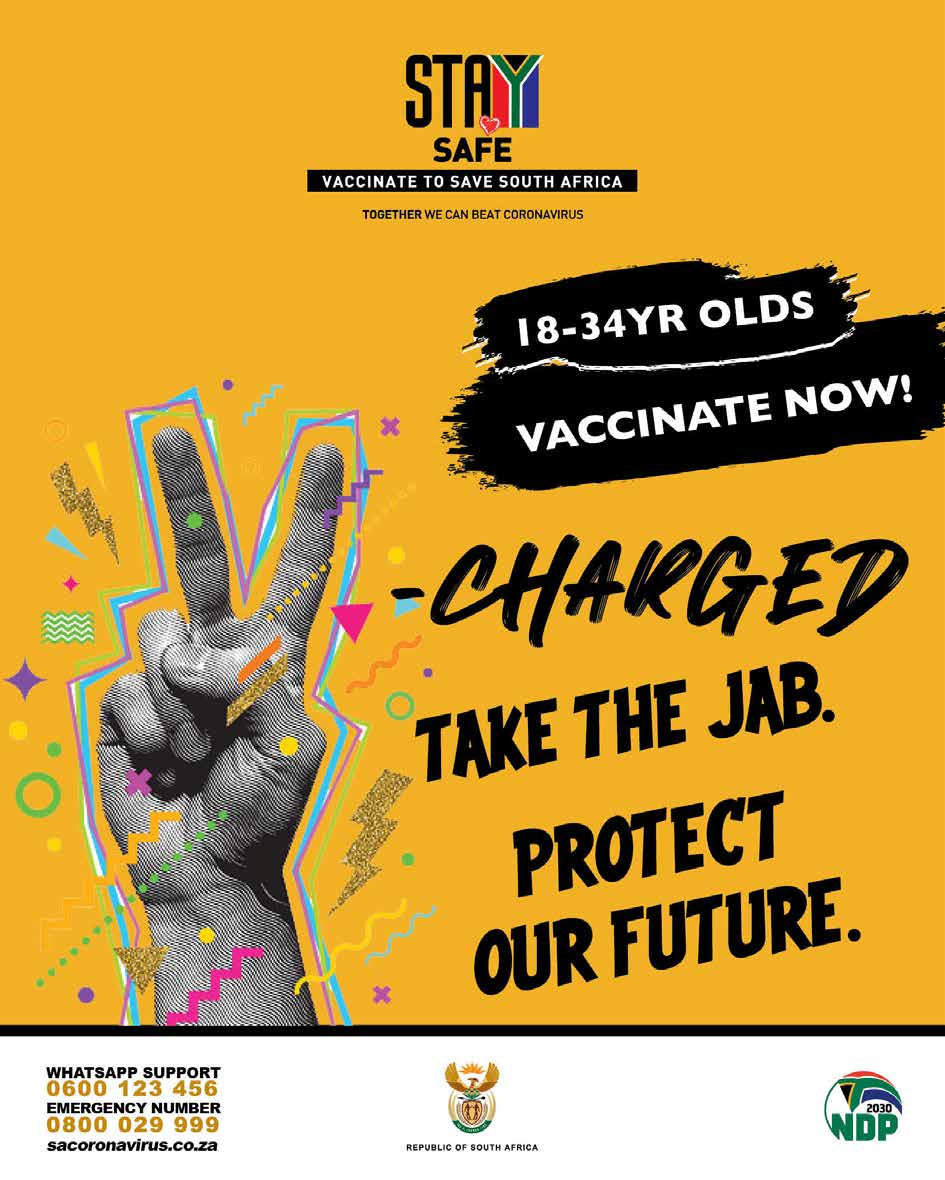
Tourism goes green
Tourism goes green UrsulaSmall tourism enterprises are encouraged to apply for government’s Green Tourism Incentive Programme. 
The Department of Tourism’s Green Tourism Incentive Programme (GTIP) is encouraging privately-owned enterprises to reduce their costs by adopting responsible practices, such as saving water and energy.
The programme provides grants of up to R1 million to qualifying small and micro tourism enterprises to install energy and water efficient solutions.
The programme was lau-
nched in 2017, but was reviewed in 2021 to include water and energy efficiency benefits. It is implemented and administered by the Industrial Development Corporation (IDC).
Tourism Minister Lindiwe Sisulu believes there will be a greater demand for new and diverse tourism offerings, especially those that promote saving scarce natural resources.
“Through the implementation of the GTIP, we envision creating a sector that is inclusive and sustainable, creating a pathway for new entrants to implement innovative businesses that make tourism thrive,” the Minister says.
She encourages all enterprises, especially youth and women-owned businesses, to apply and contribute to transforming the sector.
Applications close on 31 March 2022.
GTIP benefits
The GTIP:
- Covers the full cost of a new resource efficiency audit and of reviewing an existing audit;
- Appoints an assessor to conduct resource efficiency audits, to determine the best solutions to be implemented;
- Offers grant funding on a sliding scale from 50% to 90% of the total cost of the approved energy and water efficiency solutions, up to a capped amount of R1 million. The balance is to be covered by the applicant (either through own resources or from other reputable funding institutions, including the IDC).
- The grant funding will be paid directly to service providers/installers.
How to apply
The application process has two phases. In phase one, enterprises apply for the energy and water efficiency audit. In phase two, they apply for funding to implement the recommended solutions.
For more information, visit https://www.idc.co.za/green-tourism-incentive-programme, email: gtip@idc.co.za or call Nikki Malindi at 011 269 3073.
Umpire Patrick Selepe breaks new ground
Umpire Patrick Selepe breaks new ground SiboneloPatrick Selepe made history at the 2021 Tokyo Paralympics by becoming the first person with a disability to serve as an official at the Paralympic wheelchair tennis event.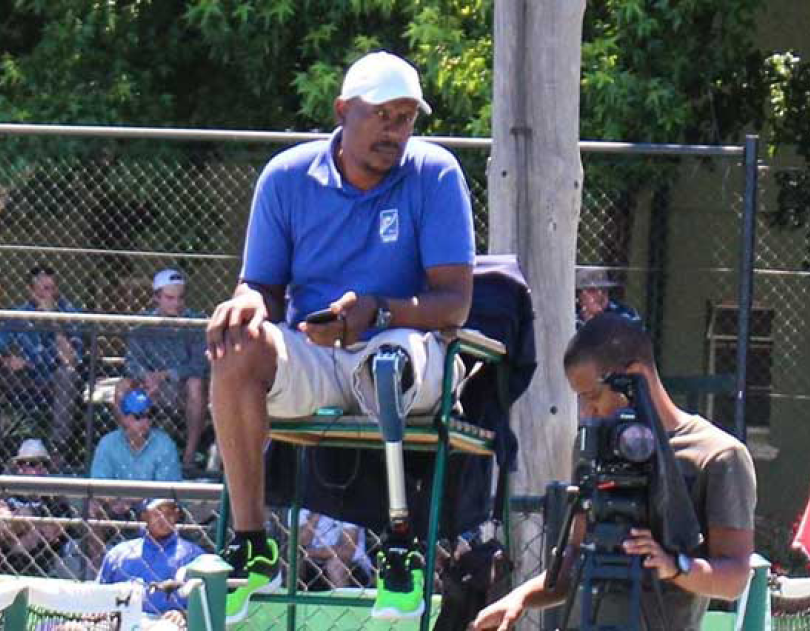
Selepe’s journey started after being diagnosed with bone cancer at 19, when he had to have his leg amputated above the knee.
“After getting out of hospital, it was a new journey for me. I didn’t have much knowledge about living with a disability, but I knew that locking myself away was not the solution,” says Selepe.
He saw a TV programme about Fanie Lombaard, a South African Paralympic gold medallist and record holder in discus, shotput and javelin.
“I immediately took an interest, enquired about Paralympic sports at the provincial sports department and was sent to a club where I started participating in wheelchair basketball and athletics.”
He excelled at athletics and went on to break the South African record for high jump (1.52m).
“This generated a lot of media interest and I started to grow in the world of sport.”
Turning to tennis
In 2003, Selepe was approached to establish Wheelchair Tennis South Africa. He developed from player to coach, administrator, development officer and mentor and, eventually, world-class official.
Selepe excelled as a player, reaching a world ranking of 60 (singles) and 75 (doubles).
He is also the first person living with a disability to serve as a line umpire at a Wimbledon qualifier and the first South African chair umpire with a disability to officiate a Davis Cup match.
Selepe says sport afforded him many opportunities.
“I never travelled out of my country until I travelled for sport… I’d never even taken a local flight – my first flight was to Holland,” he says.
His Tokyo 2021 Paralympic journey is a dream come true.
“I have never made it to this level before,” says Selepe. He acknowledges the support he received from his wife and sons.
Selepe is now focused on local athlete development, under the guidance of US-based Global Sports Mentoring Programme.
Understanding the role of your ward councillor
Understanding the role of your ward councillor tsoanaOn November 1, South Africans will vote for their preferred candidates for councillor positions in their respective areas.
Vuk’uzenzele consulted with the Department of Cooperative Governance and Traditional Affairs and the South African Local Government Association on what a voter needs to understand about the role of a ward councillor. Below are some of the responsibilities of a ward councillor.
1. A ward councillor has to know and attend to your community’s needs
Each financial year, municipalities set aside budgets for development and services for the areas within their jurisdiction. A good councillor has to know what his/her community needs are and which ones are priorities. A councillor does not decide on their own but consults with the community and take their interests to the municipal council.
2. Speaks on your behalf
Whenever a community has an issue with service delivery or faces development challenges, a councillor has a responsibility to speak for the community and advocate for the resolution of the issue. A councillor has to ensure a better and improved life for all the people in his/her ward.
3. Votes on your behalf
Your councillor is not only responsible for your ward, but also serves in the council of the municipality. Municipal issues affecting all wards in a municipality are discussed and voted on for resolutions at the council. Not all residents can be present in those meetings. Therefore, a councillor votes on behalf of all the people in their ward.
4. Monitors the performance of the municipality
Councillors have to ensure accountability. While they may not instruct a municipal official on how to do their job, it is their responsibility to keep track of the work that officials do and make sure it is of acceptable standards. If a municipality has planned a project, but does not deliver, a councillor has to, on behalf of the residents in the ward, question that until there is accountability. If a community wants to march to the municipality to present a complaint or a memorandum of demands, a councillor has to assist the people to draft documents as well as direct them to relevant officials who can approve the march.
What would people have said?
What would people have said? Sibonelo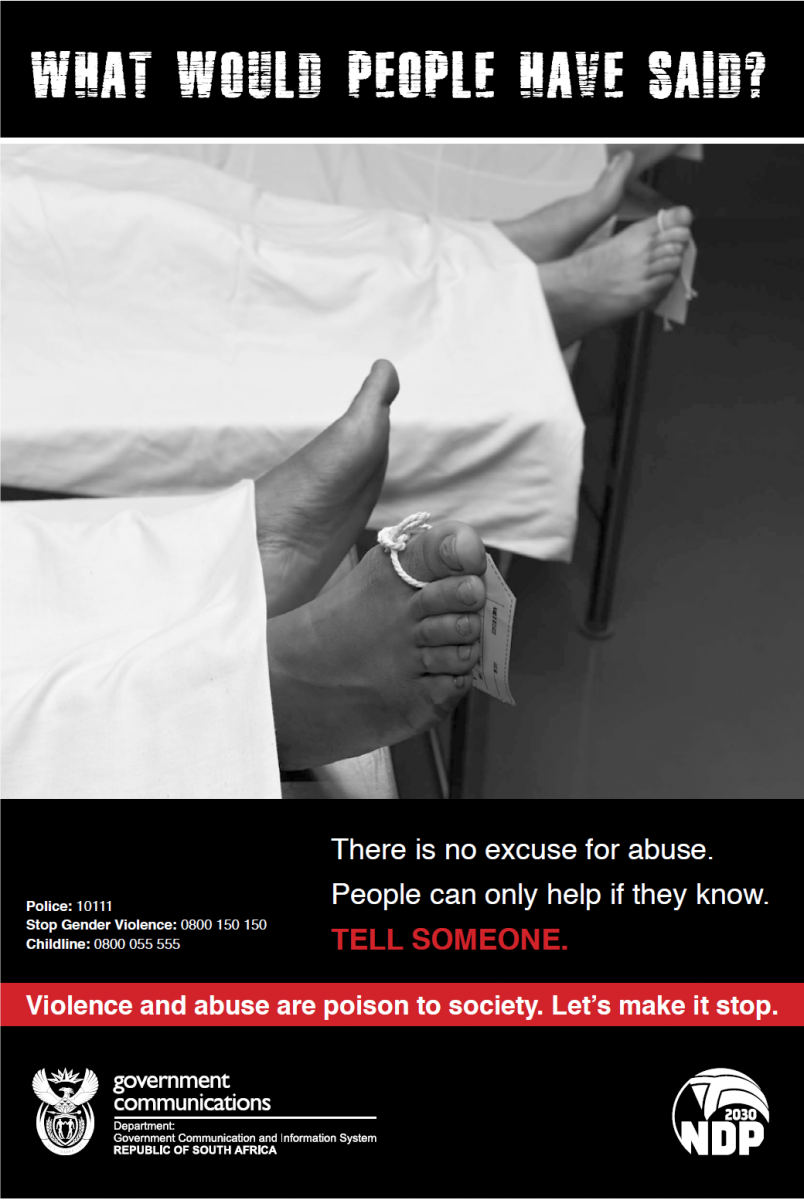
Women taxi owners take different route to success
Women taxi owners take different route to success UrsulaWhen the outbreak of the Coronavirus Disease (COVID-19) pandemic led to profit loss in the public transport business, three KwaZulu-Natal women taxi owners found a new way to supplement their income within the sector. 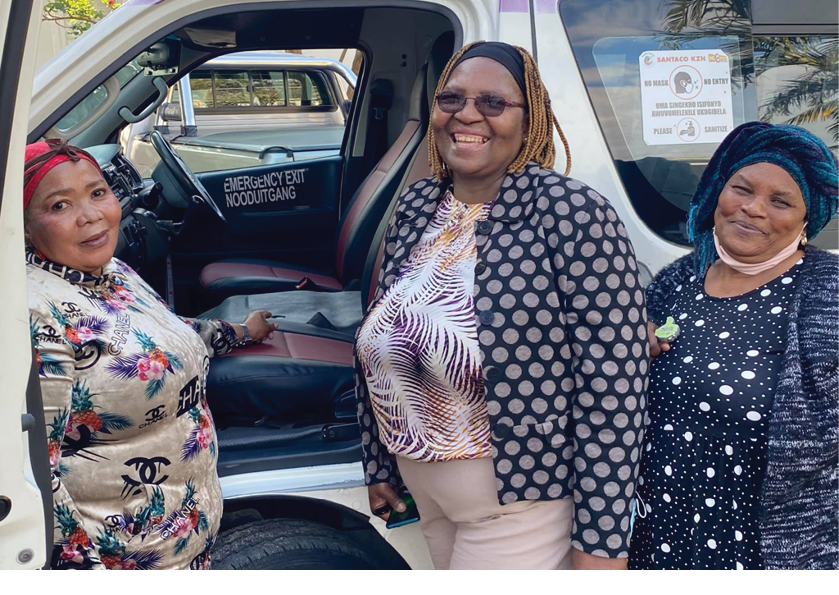
Joyce Hlobo, Joyce Nkosi and Mavis Ndlela have started How Long Service, an upholstery business for minibus taxis that is receiving support from taxi owners in local taxi associations.
The three enterprising women manufacture seat covers for HiAce, Toyota, Siyaya and Quantum minibus taxis. They also do patchwork for both private cars and minibus taxis.
Hlobo, the leader of the team, says they are part of a Durban Central Region women’s desk for women taxi owners. Since 2019, they have been concerned about slow profits. Things got worse when the country went into national lockdown last year because of COVID-19.
“With profits decreasing yet we had loans to pay back and families to look after, I presented the idea to the women’s desk for us to diversify our business and not only expect income from passenger fares,” explains Hlobo.
While others were hesitant to join, Nkosi and Ndlela bought into Hlobo’s idea. They started with two sewing machines. They then showed their work to local taxi associations and asked for support.
“When a person needs us to cover their car, they let us know. Since we know the minibus taxi sizes, we know exactly what measurements to make. Once we are done manufacturing the covers, they bring the taxis to us and we spend about three hours fitting in the covers,” explains Hlobo.
The women have lauded Yusuf Khalifa, who is the chairperson of the South Beach and North Beach Taxi Association in Durban, for marketing their business and urging taxi owners to use their services.
“I encourage women to find ways to make money. We cannot cry for losses we are making in business and hope things will eventually go back to normal. We need to help ourselves,” says Hlobo.